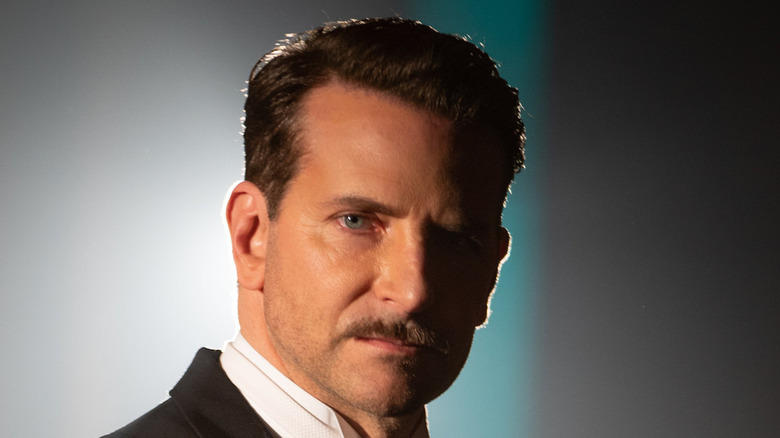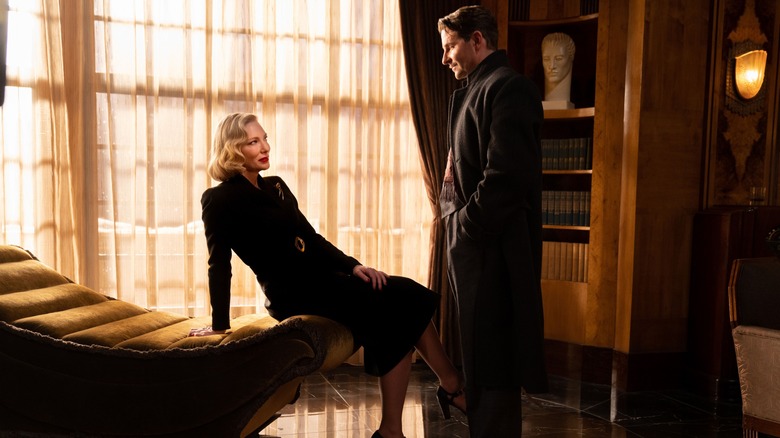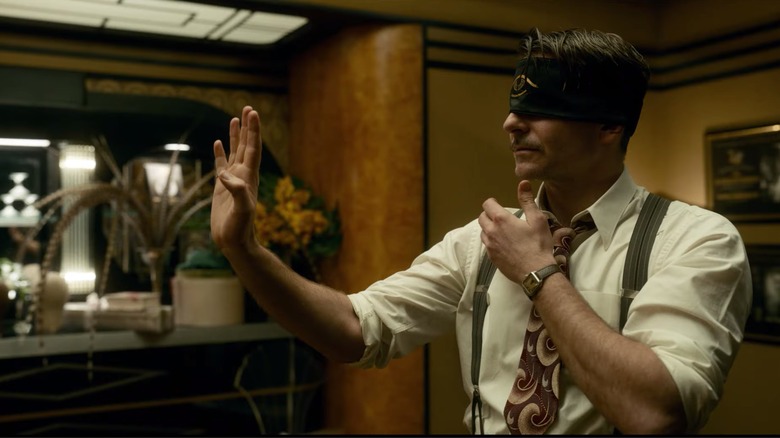Nightmare Alley Review: Carnival Of Souls
Guillermo del Toro and film noir always felt like a good match for each other. That particular subgenre, with its not-quite-reality portraits of light and shadow playing off each other and its blurring lines of morality and sanity, has been hinted at many times in the beautiful darkness of Del Toro's previous films, whether in the street chases of "Hellboy" or the Cold War grit of key pieces of "The Shape of Water." The filmmaker's visual sensibility, coupled with his tendency to immerse himself in the details of every project he takes on, hinted that if he ever did take on a noir-tinged project with the full force of his creative powers, it would be something special. Now "Nightmare Alley" is here, and those suspicions have been proven correct.
Adapted from William Linsay Gresham's 1946 novel of the same (previously adapted by director Edmund Goulding in 1947), "Nightmare Alley" has all the makings of a prime Del Toro visual showcase. With a story that takes him from the mud and dirt of carnival life to the splendor of post-war American excess and places in between, it's the kind of film Del Toro fans, and Del Toro himself, can get happily lost in. That means, like all of Del Toro's best work, it's a deeply immersive experience, but rather than weaving fantasy worlds, this time cinema's most passionate monster maker is confronting some very human distortions.
Carnival Noir
"Nightmare Alley" begins with Stanton Carlisle (Bradley Cooper), a drifter who finds his way to a carnival one night in the late 1930s and, through a combination of good looks and willingness to do hard work, endears himself to the man who runs the freak show (Willem Dafoe). Before long, Stan's also made his way into the good graces of the show's resident medium (Toni Collette), her mentalist partner (David Straitharn), and other members of the caravan, even if some, like the strongman (Ron Perlman), are suspicious of his motives.
Immediately drawn to mentalism thanks to his gift for reading people and manipulating them into getting what he wants, Stan falls for fellow performer Molly (Rooney Mara) and makes his way to the big city to use his newfound gift to relieve wealthy patrons of their money. But success brings with it more than just a glittering art deco hotel room. Thanks to an encounter with a mysterious psychiatrist named Lilith (Cate Blanchett) and an eccentric business tycoon (Richard Jenkins), Stanton finds himself embroiled in a dark game in which the stakes keep rising. If he stays in it long enough, he'll be rich, but a second too long could cost him far more than his fortune.
Within this framework, Del Toro and his co-writer Kim Morgan unpack a fascinating exploration of grief, addiction, sin (it's not accident that there's a woman named Lilith in this film), guilt, and greed, all of which make "Nightmare Alley" classic noir fodder even decades after the original film made it a classic of the genre. Stylistically, Del Toro's intuitive grasp of the visual contrasts at work in the story, from the carnival to the palatial urbanism of the movie's back half, serves him extremely well. It's among his best-looking films, from the set design to the costuming to the way his camera seems to glide around each carefully ornamented space. From the ornate and carefully locked down space of Lilith's office to the sprawling snow-swept garden's of a tycoon's mansion, it's all gorgeously staged, offering a perfect playground for Del Toro's deeper thematic probing.
Human Monsters
Guillermo del Toro has built his reputation with stories about monsters that exist as powerful, often moving metaphors for our lives as humans, from the workaday battles of "Hellboy" to the fairy tale journeys of "Pan's Labyrinth" to the love among the broken in "The Shape of Water." Aside from a few specimens in jars, there are no monsters in "Nightmare Alley" that fit the classic Del Toro mold. Instead he turns that lens on his human characters, themselves distortions of who they once were or could have been, and he gets phenomenal results along the way.
Through his mentalism act and the increasingly bold ways in which he wields it, Stanton becomes not just a con man and performer, but a storyteller, weaving narratives and even pulling off special effects and stunts to please his clients. Over time, as the stakes grow higher and the stories get bolder, he becomes addicted to his own stories, whether it's because of the money or because they allow him to escape the past he's spent years running from. Lilith too becomes addicted to these stories, to the way in which Stanton is willing and able to warp and wield the truth and the fiction that fits inside it. Even more than his other films, it's a very apt metaphor for Del Toro's own impassioned filmmaking style, and in that way "Nightmare Alley" becomes an exploration of what it costs to tell stories, what happens when use those powers for ill, and what we become when our passions consume us.
It's also, of course, a showcase for the most impressive cast Del Toro has assembled in a career full of impressive casts. Cooper has movie star swagger for days, Collette is reliably compelling, Straitharn infuses his scenes with moving melancholy, and Mara throws herself into the bittersweet rhythms of her character. Then there's Blanchett, who is as magnetic as she has ever been in her scenes, stealing the moment from even the very capable Cooper. "Nightmare Alley" works well as a two-hander between them, in the moment when Stanton and Lilith are sparring with each other in that gilded therapist's office, but when it opens up as an ensemble piece, it shines all the more.
All of this forms another triumphant directorial performance for Guillermo del Toro, one that proves his enduring versatility and ability to place his own distinctive mark on any number of stories. It might not have the instant appeal of "The Shape of Water" or "Pacific Rim," but it deserves to be remembered as one of the filmmaker's best, and time will only be kinder to this dark portal to another time and place.
"Nightmare Alley" is in theaters December 17.


